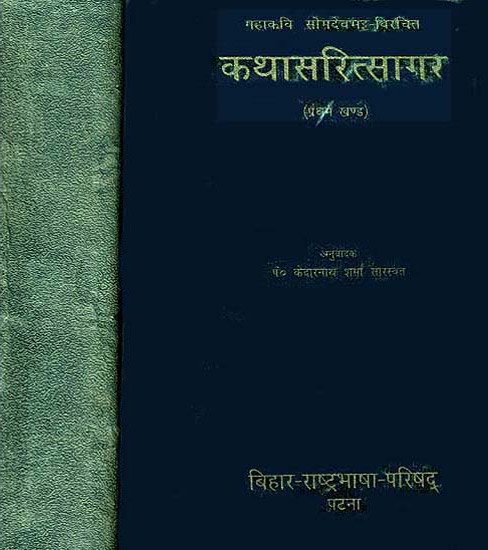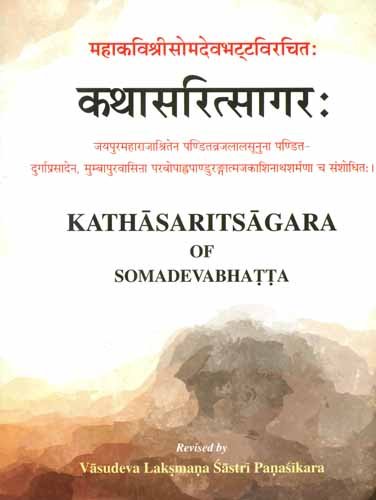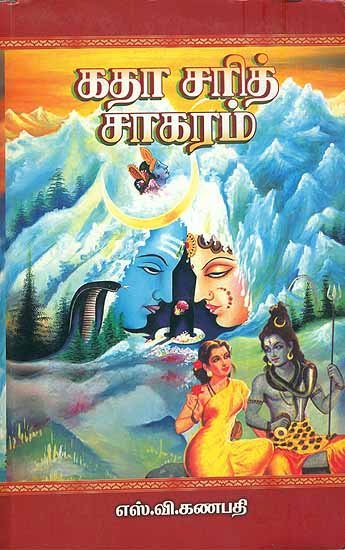Kathasaritsagara [sanskrit]
by C. H. Tawney | 2014 | 226,424 words | ISBN-13: 9789350501351
The Sanskrit edition of the Kathasaritsagara referencing the English translation and grammatical analysis. Written by Somadeva and dating from the 12th century, the Kathasaritsagara (or Katha-sarit-sagara) represents an epic legend narrating the adventures of Naravahanadatta as he strives to become the destined emperor of the Vidyadharas. Alternative titles: (Kathāsaritsāgara, कथासरित्सागर, Kathā-sarit-sāgara)
Verse 8.4.120
ततो ऽतिरसतश् च ता विगतयन्त्रणानर्गलाः परस्परम् उपादिशन् सुरतकार्यतन्त्राण्य् अपि ।
प्रसङ्गमिलिताः कथाप्रसरसक्तचित्ता मिथस् तद् अस्ति न किम् अप्य् अहो यद् इह नोद्वमन्ति स्त्रियः ॥ १२० ॥
tato 'tirasataś ca tā vigatayantraṇānargalāḥ parasparam upādiśan suratakāryatantrāṇy api |
prasaṅgamilitāḥ kathāprasarasaktacittā mithas tad asti na kim apy aho yad iha nodvamanti striyaḥ || 120 ||
The English translation of Kathasaritsagara Verse 8.4.120 is contained in the book The Ocean of Story by C.H. Tawney. This book is available online or you could buy the latest edition:
Read online Buy now! The English translation by C.H. Tawney (2014)
Glossary of Sanskrit terms
Note: This extracts Sanskrit terms and links to English definitions from the glossary, based on an experimental segmentation of verse (8.4.120). Some terms could be superfluous while some might not be mentioned. Click on the word to show English definitions.
Tatah, Tad, Tata, Atirasa, Tas, Vigata, Yantrana, Anargala, Parasparam, Paraspara, Upa, Api, Prasanga, Ilita, Katha, Prasara, Sakta, Citta, Mithah, Tat, Asti, Kim, Ahan, Yat, Yad, Iha, Asmad, Dva, Anti, Stri,
Analysis of Sanskrit grammar
Note: this is an experimental feature and only shows the first possible analysis of the Sanskrit text (Kathasaritsagara Verse 8.4.120). If the system was successful in segmenting the sentence, you will see of which words it is made up of, generally consisting of Nouns, Pronouns, Verbs, Participles and Indeclinables. Click on the link to show all possible derivations of the word.
- Line 1: “tato 'tirasataś ca tā vigatayantraṇānargalāḥ parasparam upādiśan suratakāryatantrāṇy api ”
- tato' -
-
tataḥ (indeclinable adverb)[indeclinable adverb]tataḥ (indeclinable correlative)[indeclinable correlative]tataḥ (indeclinable)[indeclinable]tad (noun, neuter)[ablative single], [ablative dual], [ablative plural]tata (noun, masculine)[nominative single]√tan -> tata (participle, masculine)[nominative single from √tan class 8 verb]sa (noun, masculine)[ablative single], [ablative dual], [ablative plural]sā (noun, feminine)[ablative single], [ablative dual], [ablative plural]
- atirasa -
-
atirasa (noun, masculine)[compound], [vocative single]atirasa (noun, neuter)[compound], [vocative single]
- taś -
-
tas (noun, masculine)[compound], [vocative single]tas (noun, neuter)[compound], [nominative single], [vocative single], [accusative single]ta (noun, masculine)[nominative single]
- ca -
-
ca (indeclinable conjunction)[indeclinable conjunction]ca (noun, masculine)[compound], [vocative single]ca (noun, neuter)[compound], [vocative single]
- tā* -
-
ta (noun, masculine)[nominative plural], [vocative plural]tā (noun, feminine)[nominative plural], [vocative plural], [accusative plural]tas (noun, masculine)[nominative single]sā (noun, feminine)[nominative plural], [accusative plural]
- vigata -
-
vigata (noun, neuter)[compound], [vocative single]vigata (noun, masculine)[compound], [vocative single]
- yantraṇā -
-
yantraṇa (noun, neuter)[compound], [vocative single]
- anargalāḥ -
-
anargala (noun, masculine)[nominative plural], [vocative plural]anargalā (noun, feminine)[nominative plural], [vocative plural], [accusative plural]
- parasparam -
-
parasparam (indeclinable)[indeclinable]paraspara (noun, masculine)[adverb], [accusative single]paraspara (noun, neuter)[adverb], [nominative single], [accusative single]parasparā (noun, feminine)[adverb]
- upā -
-
upā (indeclinable)[indeclinable]upa (indeclinable adverb)[indeclinable adverb]upa (indeclinable preposition)[indeclinable preposition]upa (indeclinable)[indeclinable]upa (Preverb)[Preverb]upā (Preverb)[Preverb]
- adiśan -
-
√diś (verb class 6)[imperfect active third plural]
- Cannot analyse suratakāryatantrāṇy*ap
- api -
-
api (indeclinable preposition)[indeclinable preposition]ap (noun, neuter)[locative single]api (Preverb)[Preverb]
- Line 2: “prasaṅgamilitāḥ kathāprasarasaktacittā mithas tad asti na kim apy aho yad iha nodvamanti striyaḥ ”
- prasaṅgam -
-
prasaṅga (noun, masculine)[adverb], [accusative single]
- ilitāḥ -
-
√il -> ilita (participle, masculine)[nominative plural from √il class 10 verb], [vocative plural from √il class 10 verb], [nominative plural from √il], [vocative plural from √il]√il -> ilitā (participle, feminine)[nominative plural from √il class 10 verb], [vocative plural from √il class 10 verb], [accusative plural from √il class 10 verb], [nominative plural from √il], [vocative plural from √il], [accusative plural from √il]
- kathā -
-
kathā (noun, feminine)[nominative single]
- prasara -
-
prasara (noun, masculine)[compound], [vocative single]prasara (noun, neuter)[compound], [vocative single]
- sakta -
-
sakta (noun, masculine)[compound], [vocative single]sakta (noun, neuter)[compound], [vocative single]√sag -> sakta (participle, masculine)[vocative single from √sag class 1 verb]√sag -> sakta (participle, neuter)[vocative single from √sag class 1 verb]√saj -> sakta (participle, masculine)[vocative single from √saj class 1 verb]√saj -> sakta (participle, neuter)[vocative single from √saj class 1 verb]√sañj -> sakta (participle, masculine)[vocative single from √sañj class 1 verb]√sañj -> sakta (participle, neuter)[vocative single from √sañj class 1 verb]
- cittā* -
-
citta (noun, masculine)[nominative plural], [vocative plural]cittā (noun, feminine)[nominative plural], [vocative plural], [accusative plural]
- mithas -
-
mithaḥ (indeclinable adverb)[indeclinable adverb]mithaḥ (indeclinable)[indeclinable]
- tad -
-
tad (indeclinable)[indeclinable]tad (indeclinable adverb)[indeclinable adverb]tat (indeclinable correlative)[indeclinable correlative]tad (noun, neuter)[compound], [nominative single], [accusative single]
- asti -
-
asti (noun, feminine)[compound], [adverb]astī (noun, masculine)[adverb], [vocative single]astī (noun, feminine)[compound], [adverb], [vocative single]astī (noun, neuter)[compound], [adverb], [nominative single], [vocative single], [accusative single]√as (verb class 2)[present active third single]
- na -
-
na (indeclinable particle)[indeclinable particle]na (noun, masculine)[compound], [vocative single]na (noun, neuter)[compound], [vocative single]
- kim -
-
kim (indeclinable interrogative)[indeclinable interrogative]kim (indeclinable)[indeclinable]kim (pronoun, neuter)[nominative single], [accusative single]
- Cannot analyse apy*ah
- aho* -
-
ahan (noun, neuter)[compound], [adverb], [nominative single], [vocative single], [accusative single]ahar (noun, neuter)[adverb]√has (verb class 1)[aorist active second single]
- yad -
-
yat (indeclinable relative)[indeclinable relative]yat (noun, masculine)[compound]yad (noun, masculine)[compound], [adverb], [nominative single], [vocative single]yat (noun, neuter)[nominative single], [vocative single], [accusative single]√i -> yat (participle, neuter)[nominative single from √i class 2 verb], [vocative single from √i class 2 verb], [accusative single from √i class 2 verb]yat (pronoun, neuter)[nominative single], [accusative single]
- iha -
-
iha (indeclinable adverb)[indeclinable adverb]iha (indeclinable)[indeclinable]
- no -
-
na (noun, masculine)[nominative single]nu (noun, masculine)[vocative single]asmad (pronoun, none)[accusative plural], [dative plural], [genitive plural]
- dvam -
-
dva (noun, masculine)[adverb], [accusative single]dva (noun, neuter)[adverb], [nominative single], [accusative single]dvā (noun, feminine)[adverb]
- anti -
-
anti (indeclinable adverb)[indeclinable adverb]anti (noun, feminine)[compound], [adverb]antī (noun, feminine)[adverb], [vocative single]
- striyaḥ -
-
strī (noun, feminine)[nominative plural], [vocative plural], [accusative plural]
Other editions:
Also see the following editions of the Sanskrit text or (alternative) English translations of the Kathasaritsagara Verse 8.4.120
Kathasaritsagar
by Kedarnath Sharma Saraswat (2005)
The Only Edition with the Sanskrit Text and its Hindi Translation (An Old and Rare Book) Set of 3 Vol.
Buy now!
Kathasaritsagara of Somadeva Bhatta (Sanskrit Text Only)
by Vasudeva Laksmana Sastri (2013)
Katha Sarit Sagar in Marathi
by H. A Bhave (1995)
Set of 5 Volumes; Published by Varada Books, Pune. 2256 pages (Throughout B/W Illustrations).
Buy now!
Katha Sarit Sagara (Tamil)
by S. V. Ganapati (எஸ். வி. கணபதி) (2014)
[கதா சரித் சாகரம்] Published by Alliance Publications.
Buy now!
Galpa Shono
by Abhijit Chattopadhyay (2014)
[গল্প শোনো] Galpa Shono: Bengali Translation of 'Suno Kahani From Katha Sarit Sagar'; 9788126015436; Published by Sahitya Akademi, Delhi.
Buy now!Preview of verse 8.4.120 in Bengali sript:
ততো ঽতিরসতশ্ চ তা বিগতযন্ত্রণানর্গলাঃ পরস্পরম্ উপাদিশন্ সুরতকার্যতন্ত্রাণ্য্ অপি ।
প্রসঙ্গমিলিতাঃ কথাপ্রসরসক্তচিত্তা মিথস্ তদ্ অস্তি ন কিম্ অপ্য্ অহো যদ্ ইহ নোদ্বমন্তি স্ত্রিযঃ ॥ ১২০ ॥
![Kathasaritsagara [sanskrit] - book cover](/uploads/a/Katha-Sarit-Sagara.jpg)




